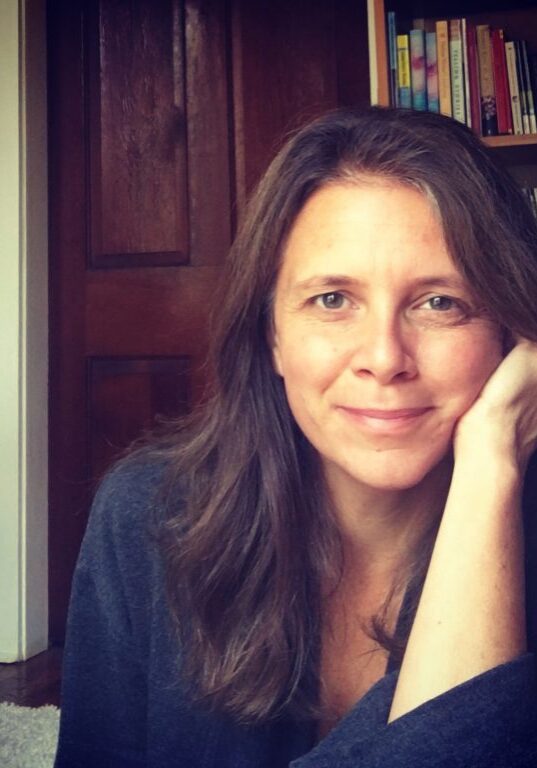The mother disappears for the first time when the daughter is twelve, driving fourteen hours straight to the Gulf of Mexico after dropping the daughter off at school. The daughter waits on the sidewalk at the end of the day; her concern grows as parents and children come and go, and the street becomes quiet. The grandmother picks her up and takes her home, going through the usual routines, as if the mother’s absence is as predictable as the cycles of the moon.
The mother returns a week later. She tells the daughter that she left because Aquarians need to be free. The mother and daughter are alone on the porch. Heat lightning snaps along the horizon. Fireflies land in the daughter’s open hands.
“Do you understand, honey?” she asks, pushing the daughter’s sweaty bangs from her eyes.
The daughter watches a firefly crawl up her own arm, the sensation almost too much to bear.
“I’m sorry,” the mother says, wrapping her arm around the daughter. “Do you understand?” she asks again when the daughter doesn’t reply.
The daughter wriggles from the mother’s embrace and pretends to catch another firefly. The daughter knows, although she is too young to understand it yet, that a jagged space exists between them, like two continents that have drifted from each other, quiet and undetectable.
Two weeks later the mother disappears again, just before the daughter’s thirteenth birthday. The mother sends the daughter a present wrapped in thick brown paper, her name written carefully in cursive on the front below a California postmark. The daughter traces the curled letters with her finger. It is a book about the astrological signs, and inside the cover, the mother has written, I am Aquarius, the water bearer. You are Pisces, the fish. She has drawn two hearts side by side, their tiny arms wrapped around each other, one with a small fish tail.
The daughter turns to the chapter about Aquarius and reads it aloud to the grandmother. “Aquarius is an air sign, not water, despite the Aquarian symbol of the water bearer. Unlike the other air signs, Aquarians are able to spend large amounts of time on their own.”
The grandmother stops scrubbing the pan in her wrinkled hands and watches through the kitchen window as a pair of cardinals gather their breakfast from the feeder.
“Aquarians suffocate in boring, repetitive routines and will seek change from stable situations to avoid being tied down for too long.”
“Sounds about right,” the grandmother says and begins scrubbing again, a little harder than before.
The daughter tosses the astrology book into the trash later that night. The stars in connect-the-dot patterns across the cover peek over the edge of the can. The grandmother takes it from the trash and sets it with the other books on the shelf in the living room. Its bright red spine disrupts the row of monotone grays and browns of old seldom-touched books.
Shortly after the book arrives, the daughter sees the mother walking through their house carrying an urn of water. The mother’s presence frightens the daughter at first. She runs and hides, only to find the mother standing there when she emerges from her hiding spot. She stares into some unknown place.
The grandmother, unaware of her daughter’s presence, walks through her daughter occasionally. The mother’s body evaporates into a million misty particles. The daughter gasps at the sight of her mother’s body breaking apart the first few times it happens. The next day the mother is whole again.
Eventually, the daughter grows accustomed to her floating in and out of the rooms, following her to school, standing in the shadows of her bedroom. Sometimes the mother stands in front of the bookshelf in the living room, staring at the astrology book she sent for the daughter’s birthday, her arms still wrapped tightly around the urn. The daughter figures she is kind of stuck that way, so she pulls the book from the shelf and begins reading to her. Her face reflects no emotion, no understanding, which the daughter decides is worse than the mother staring at the book on the shelf, so she puts it back in its place and goes to her room.
The daughter is almost eighteen now and the mother, the water bearer, still follows her. The daughter sees her in the store holding the urn when she is picking up groceries for the grandmother, the mother’s long brown hair and white dress caught in a breeze that doesn’t exist in this world. She sees her on the street corner across from the bookstore where she works. In the backseat of cars when she is on dates. The mother waits for something. The daughter is not sure what. The daughter wonders if her mother is dead, and what she sees is a ghost or if the mother has figured out how to transport another version of herself so she can be with her daughter and also be free. Or maybe the daughter is only imagining things.
The daughter knows that the water that pours from the urn is real. She has touched it. It’s clear and cool, and when she pulls her hand away, fish scales cover her skin, then vanish in the sunlight. The daughter is fascinated. She contemplates the idea of putting her face in the water, maybe other parts of her body too, but she is afraid. She searches the mother’s face for an answer. She runs and hides, only to find the mother standing there when she emerges from her hiding spot, staring into some unknown place.

